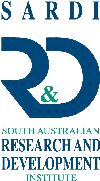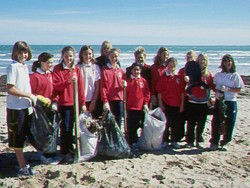| Robe Litter Survey |
|
Introduction Methods References Data entry Results |
 |
 |
 |
Introduction
Ocean Litter
Increasing use of the marine environment has contributed to the numerous forms of marine pollution. Ocean litter is one form of marine pollution that enters the ocean from a number of sources, including 'at-sea' dumping by fishing, merchant, cruise and recreational ships (Otley and Ingham, 2003). Numerous organisms can be directly and indirectly impacted by ocean based litter. Marine mammals, reptiles, fish and seabirds can become physically entangled in ocean litter or ingest smaller fragments (eg. Page et al., 2004; Volgenau et al., 1995; Carr, 1987; Mascarenhas et al., 2004; Cliff et al., 2002; Copello and Quintana, 2003). As a result animals can die, incur wounds and infections, or may suffer impaired ability to catch food and/or avoid predators, all of which place them at a disadvantage when it comes to survival. Ocean litter not only has negative impacts on marine biota, it also creates an unsafe environment for all user groups and can also reduce the aesthetic value of the beach (Jones, 1995). Thus ocean litter can negatively impact tourism, which in turn could impact negatively on local economics. Beach
Litter Surveys
Beach
Litter Surveys
Litter surveys in remote locations represent one of the most efficient and
effective ways to monitor quantities of ocean litter. Following the success
of surveys on the far west coast of South Australia (Anxious Bay; Edyvane
et al. 2004), the Robe litter survey at Long Beach (Guichen
Bay) began in 1997 and has been carried out annually (except 2006) by
the Robe Professional Fisherman's Association, in conjunction with SARDI
Aquatic Sciences and a variety of community groups. During this time, a
total of 6,700 kg of litter has been collected from Long Beach at Robe,
with levels increasing in most years (Eglinton
et al. 2006). This trend reinforces the need for continued
long-term litter monitoring to help local government manage the disposal
of litter and for a meaningful assessment of compliance and campaigns directed
towards reducing litter. Since litter surveys at Anxious Bay ceased in 2000,
Long Beach at Robe has become the only remaining site in South Australia
where ship-based ocean litter is monitored. The Robe litter survey is also
the longest running annual beach litter survey undertaken in South Australia.
The surveys have generally had an increasing success over the years, with
more volunteers becoming involved each year and in 2003, the Robe Professional
Fisherman's Association was recognised for their efforts in the Robe litter
survey in the form of a Coast Care award. By undertaking the Robe litter
survey annually, it not only cleans up the beach making it a safer environment,
but also:
- provides valuable knowledge on the volume and composition of ocean litter in South Australia and in
turn gain an understanding of possible sources
- allows the examination of long term changes in ocean litter
- increases awareness of ocean litter, encouraging the responsible disposal of litter within the fishing industry and wider community
- increases awareness of land based litter (e.g. food packaging), educating the community on responsible disposal of litter
- provides a valuable insight into the status of our oceans and the effectiveness of campaigns directed towards reducing waste disposal at sea
- allows industry to exhibit and substantiate its stewardship role in the marine and coastal environment through
examination of levels of fishing associated litter found on local coasts
This ocean litter website was designed to encourage the Robe Professional Fishermans Association and the wider community to continue the annual Robe litter survey without the support of SARDI staff. Survey data collected each year can be simply entered into the online database that will in turn produce an automated report (including graphs and tables) allowing comparisons to be made between previous years.
Acknowledgements
Funding for the development of the Robe Litter Survey website was generously provided by the Commonwealth Department of Environment and Heritage’s “Envirofund” program. SARDI Aquatic Sciences is thanked for the provision of infrastructure and a number of staff contributed to the website material, including Mandee Theil, Yvette Eglinton, Rachel Wear and David Turner. Many thanks to James Brook for constructing the website and Reef Watch for hosting the site. Thanks to the District Council of Robe and the Robe Professional Fisherman's Association for their ongoing assistance in organising and coordinating the Robe litter survey as well as the support from many local community groups during the surveys.